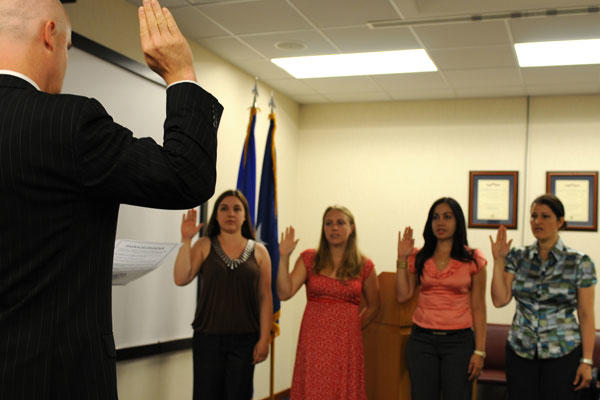President Obama made his executive order on immigration weeks after a recent reversal of a U.S. immigration policy that will separate some military and Veterans Affairs employees from their spouses.
The U.S. Citizenship and Immigration Service reversed a policy whereby it automatically granted legal residency status to spouses of doctors and those with critical language skills who came to the U.S., joined the military and were fast-tracked to citizenship.
The reversal will force spouses to go back to their country of origin, stay there two years, and then apply to come to the U.S., just as any foreign visitor or student in the U.S. would have to do.
"They did just notify an Army doctor in Baltimore and another in Kansas City that their spouses' green-card applications are going to be denied and the spouses will have to go 'home' for two years," said Margaret Stock, a retired Army Reserve officer who pitched the Military Accessions Vital to the National Interest program to the Army in 2008.
"This will end up working out to a three-and-a-half year separation because ... the spouses will have to re-apply for green cards from overseas after two years, and it is taking [the State Department and Department of Homeland Security] about a year-and-a-half to process [the] applications," she said.
Citizenship and Immigration Services should be embarrassed by the policy, Stock said.
Obama's speech on immigration Thursday night included nothing specific to the military, but focused on children and young adults who he said have "lived in shadows" -- brought to the U.S. as children, raised here but who do not have citizenship.
He outlined a series of steps intended to make the borders more secure and emphasize deportations of convicted felons and individuals suspected of terrorism and gang activity rather than the parents of U.S.-born citizens who have committed no offense beyond being in the U.S. illegally.
Obama also said his executive order will make it easier and faster for high-skilled immigrants, graduates and entrepreneurs to stay and contribute to our economy, as so many business leaders proposed.
But the policy reversal made by the U.S. Citizenship and Immigration Service when it comes to foreign spouses of U.S. troops seems to fly in the face of that effort. A doctor with a family may think twice about accepting citizenship if it means the family must be separated for years, according to Stock.
She estimated there are about 300 Army doctors who may fit this profile. And many doctors who have come through the program are in the Army Reserve and work full time at VA hospitals across the country.
The policy change comes as VA Secretary Bob McDonald has been making the rounds of the country's medical schools in an effort to recruit new doctors. Army Recruiting Command projects it will fall short of its fiscal 2015 recruiting goals for doctors by 35 in the active duty and 77 in the Reserve.
One spouse affected by the reversal told Stock that once her husband became a citizen, she lost the legal dependent status she got from him being in the U.S. and the military under the special program.
"Once your husband naturalized ... you cease deriving benefits from him as a non-immigrant" in special status, the U.S. Citizenship and Immigration Service told the woman in a letter that she shared with Stock. "Specifically, you do not derive his exemption from the two-year foreign exemption requirement."
A Citizenship and Immigration official stated that spouses may apply for a waiver from the two-year rule, but that there would be no blanket waivers for spouses, Stock said.
This poses serious burdens for the families beyond the separation. It is difficult and expensive to apply for a waiver, Stock said. And for those who cannot come up with the money, there is the possibility of a spouse being returned to a country that no longer recognizes their citizenship.
-- Bryant Jordan can be reached at bryant.jordan@military.com.





























